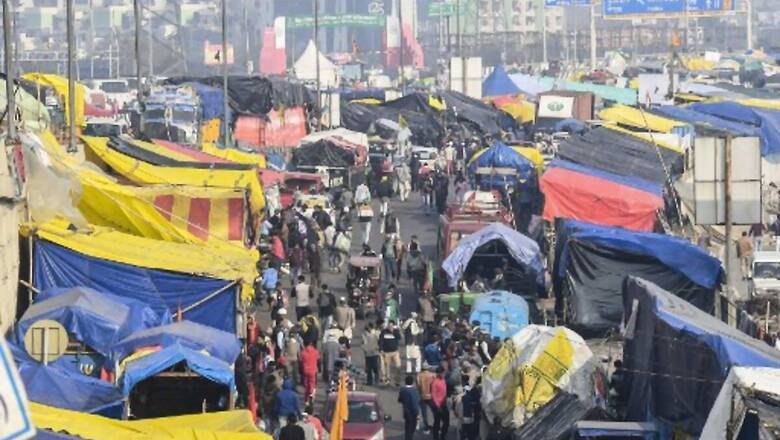
views
In a highly non-traditional role, the Supreme Court on Tuesday suspended the implementation of the three new agricultural laws passed by the Centre. It also created a committee of experts to listen to the concerns of protesting farmers and to make recommendations.
The government has accepted the verdict. In other words, the government has gone so far as to compromise on the law making power of Parliament itself. The core principles of our Constitution have been bent so that the farmer leaders feel they are being heard.
At the Singhu border, however, there is no sign of a thaw. The deadlock continues. Earlier, the government had offered them all manner of compromises and assurances. The farmer leaders would not budge. As for the court appointed committee, the latter are being treated even more poorly. The farmer leaders refuse to even meet with them. They refuse to talk and they refuse to listen. And all this while, their supporters are camped out on the borders of Delhi, braving the cold and the rain. I believe common people just want a solution. They want an end to the suffering. They wish that these good people could go back to the comfort of their homes.
The question is this. Will their so called leaders let them go home? What are the incentives of these so-called leaders? Who is gaining from this continued deadlock? And who is paying the price?
Let us talk about the four members of the court appointed committee. The farmer leaders say these members have taken public positions in support of agricultural reform. Well, so have virtually all opposition parties at some point, nearly every economist, agriculture expert and nearly every farm union in the country, including many of the ones protesting right now. So who would these farm leaders consider talking to? Further, this is not a government appointed committee, but a court appointed one. If the farmer leaders will not listen to the government, nor to the courts, who will they listen to?
The longer the deadlock continues, the better for the leaders of the farmer unions. It suits them to remain in the public eye.
Who else is gaining from the deadlock? Forces that are opposed to India, such as separatists and left-wing extremists. They have been exceptionally active, trying to dig up old wounds and give a religious twist to these protests. Many of the protesters are in a highly charged emotional state. The subversive forces see this as fertile ground. They make a number of threats, some veiled and others not so much, against the upcoming Republic Day celebrations in the capital. They openly fetishize about provoking the state to commit an act of violence against the protesters. They would like to pounce on that and tell the whole world that India is an authoritarian state. They couldn’t care less about innocent lives.
And who is paying the price? First of all, it is the protesters who have been living on the streets for over fifty days now. They are away from their homes and most of them are away from their families. Some have brought their families along, to suffer with them in the cold and the rain. All this suffering, all for nothing, when the government and the courts are willing to bend over backwards to listen to their every word. But their leaders won’t let them budge.
The ordinary people of Delhi are paying the price. They are dealing with traffic snarls, increased commutes, daily disruptions and uncertainty in their lives. Students, laborers, office workers and small traders who move in and out of the city are all suffering. Not to mention that the virus is still out there and big crowds certainly don’t help.
And finally, India is paying a price. The economy is only just recovering from the shock of Covid-19. The last thing we need is further disruption in supply chains. More importantly, investors around the world are wondering right now what the future holds for economic reform in India. If even small moves in the right direction run into this much political resistance, will the government risk further reforms?
It may be time for the government to look for ways around the so called leaders and reach out directly to the vast majority of protesters. It is time to remind these farmers of all the good things that have happened in India since the 1991 reforms. Those reforms touched every sector of the economy except agriculture. The Indian farmer knows that they have been served poorly by the government and the bureaucracy for seventy years. Does it really make sense to fight so hard to keep the old system? For Indian farmers, the moment is now. As Republic Day approaches, they have an opportunity to make a better life for themselves. They cannot let some religious separatists, vested interests and middlemen stand in the way. Nor far left extremists, whose politics does not even belong to this century.
(The writer is a mathematician, columnist and author. Views expressed are personal.)
Read all the Latest News, Breaking News and Coronavirus News here




















Comments
0 comment